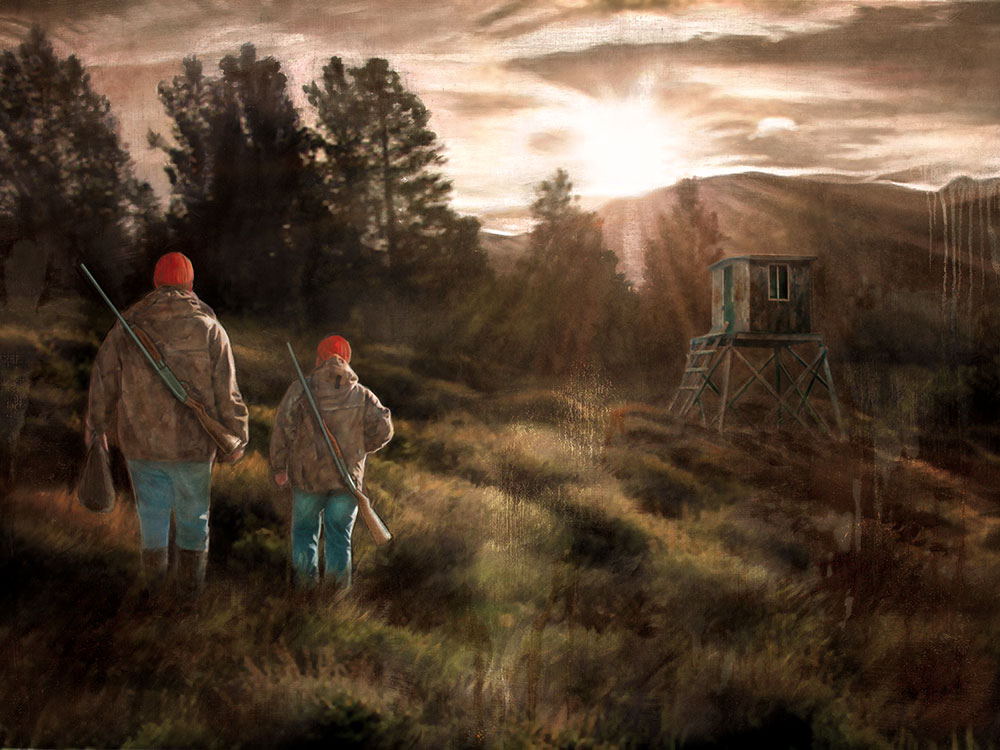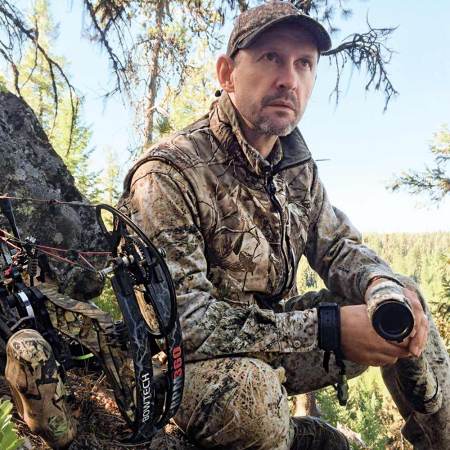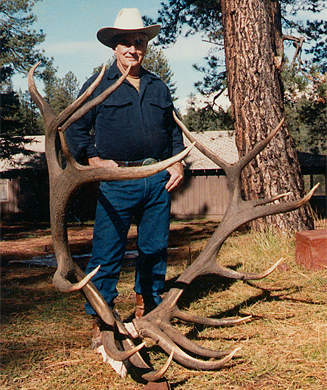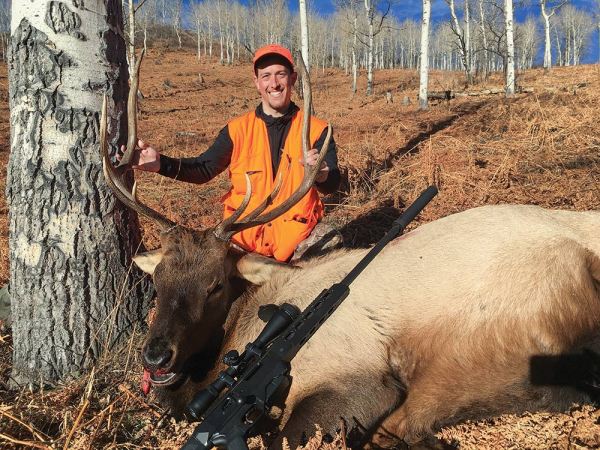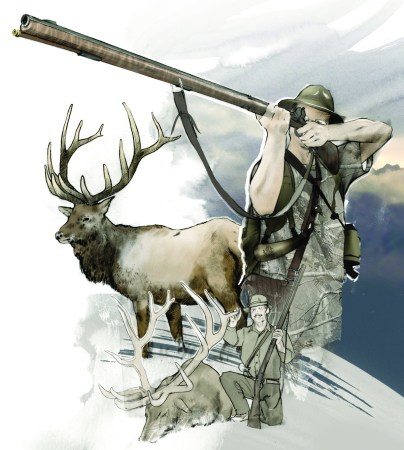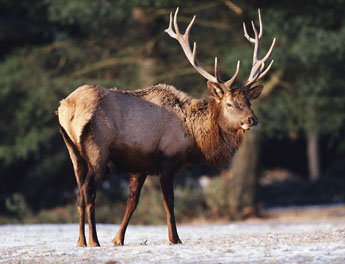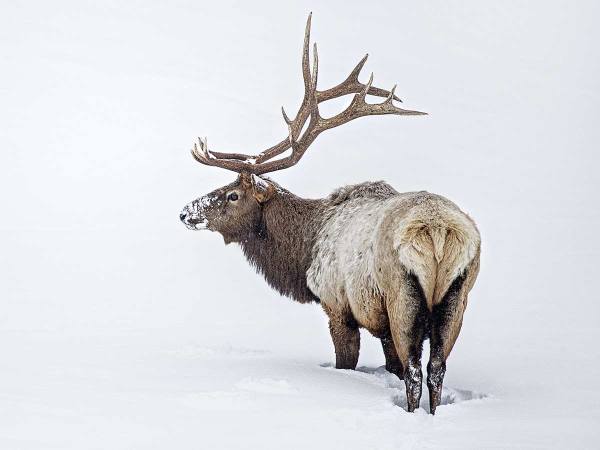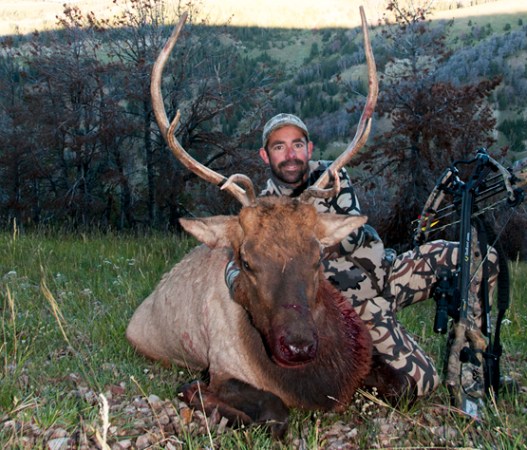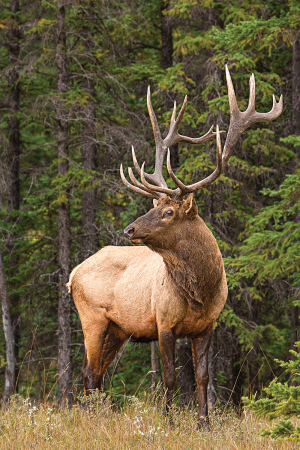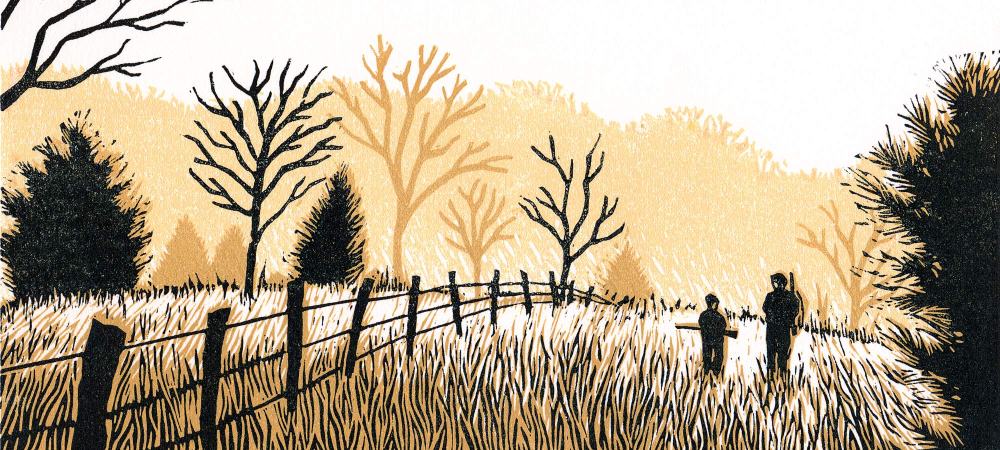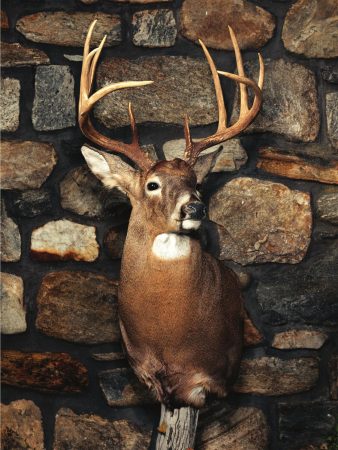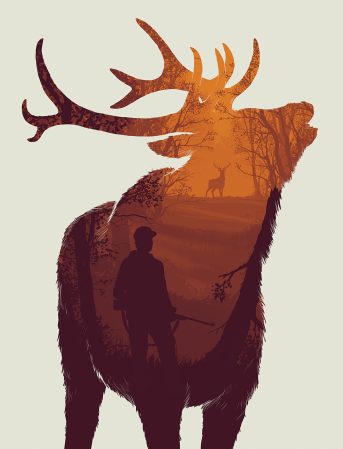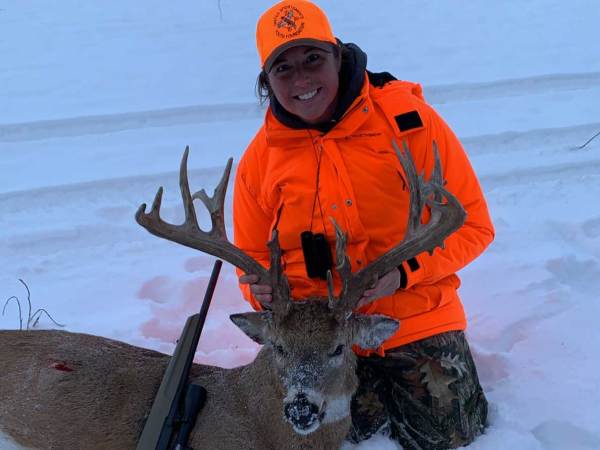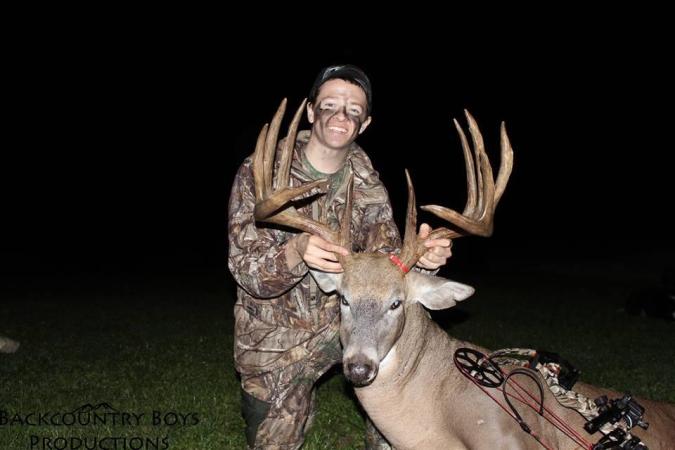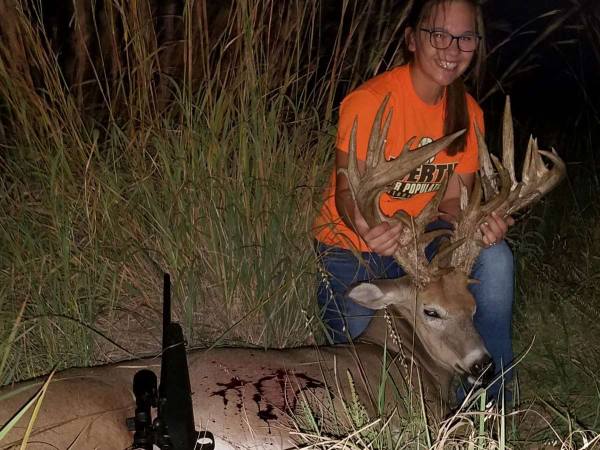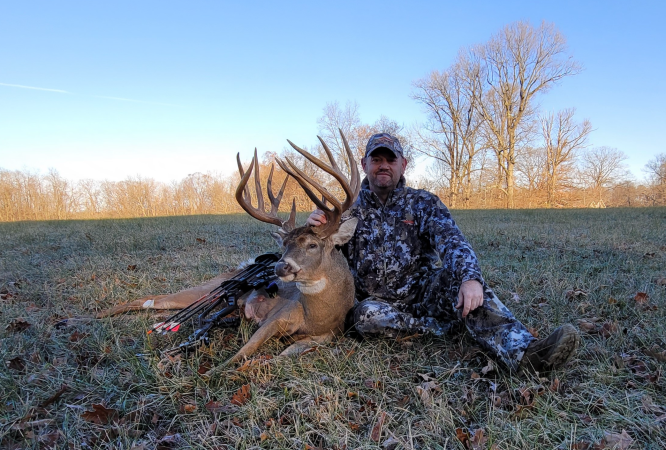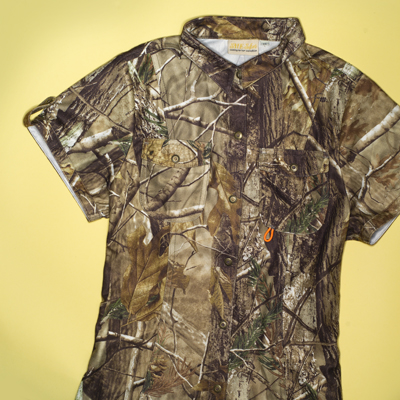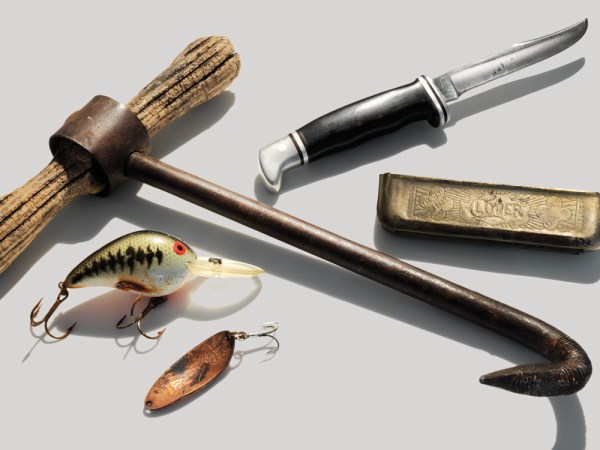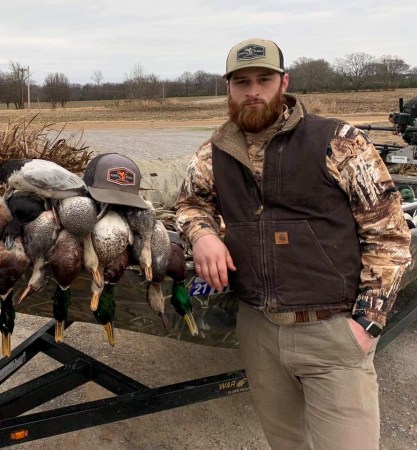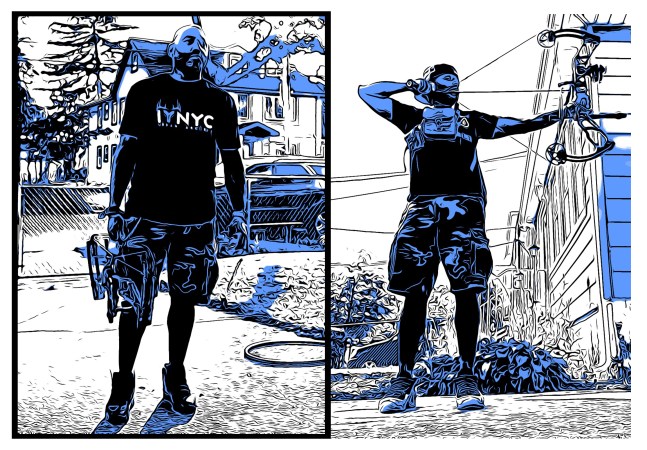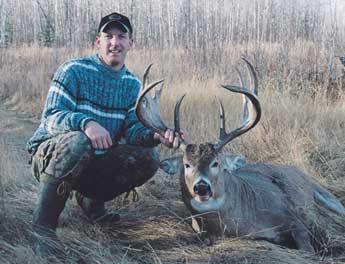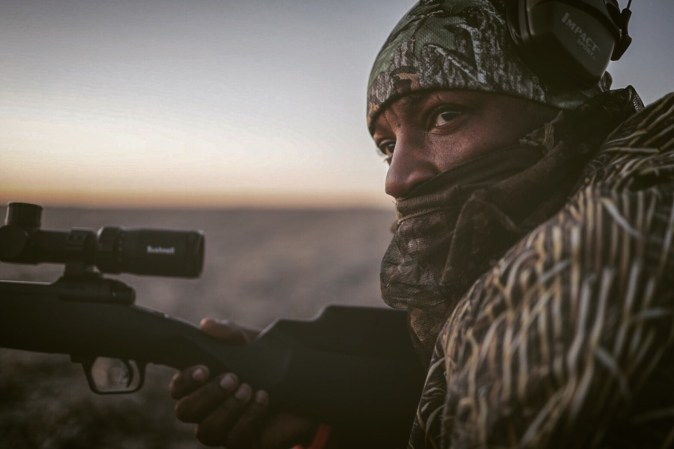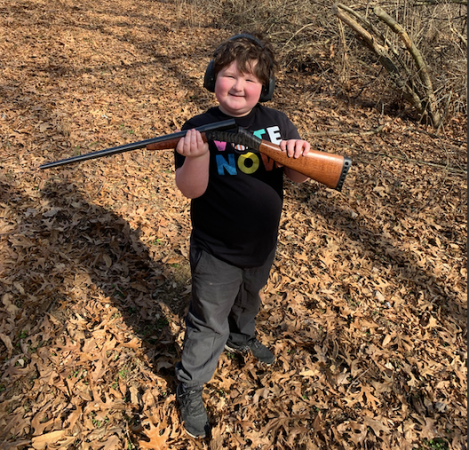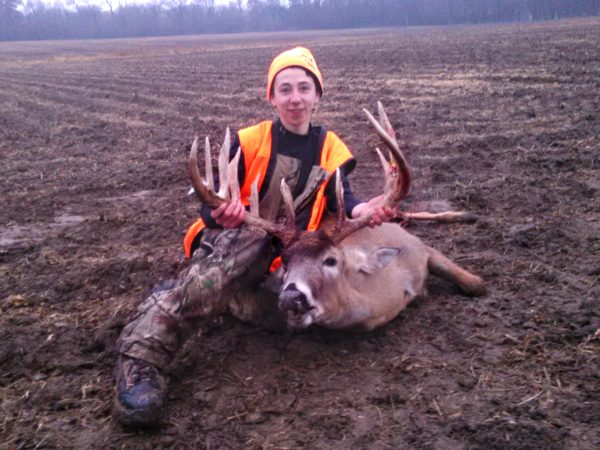My sleeping bag is as snug as I can get it, fleece dickey pulled up over my eyeballs to my stocking cap. snot is frozen to my joe dirt ’stache. I’d slept facedown most of the night in an attempt to hold my breath and body heat hostage. Futile. It’s about three hours before legal light.
I timidly shimmy out of my bag. The sky is infinitely clear, like I can see to eternity. A three-quarter moon illuminates the Colorado high-mountain lake I had circled on the map. I’m on base camp number three, six days into my hunt. I’m running out of days, but am grateful for the solitude of this moment and am anticipating an encounter with an elk—any elk. I want meat. I sit in the frigid moonlight, running my hand over the antler-tipped limbs of my recurve, remembering my dad’s smile in the picture we snapped in our driveway the night I killed the buck that wore these horns. The smells—frosty, decomposing earth, the musky inside of my stocking cap—fuel the vividness of the memory. My mind drifts.
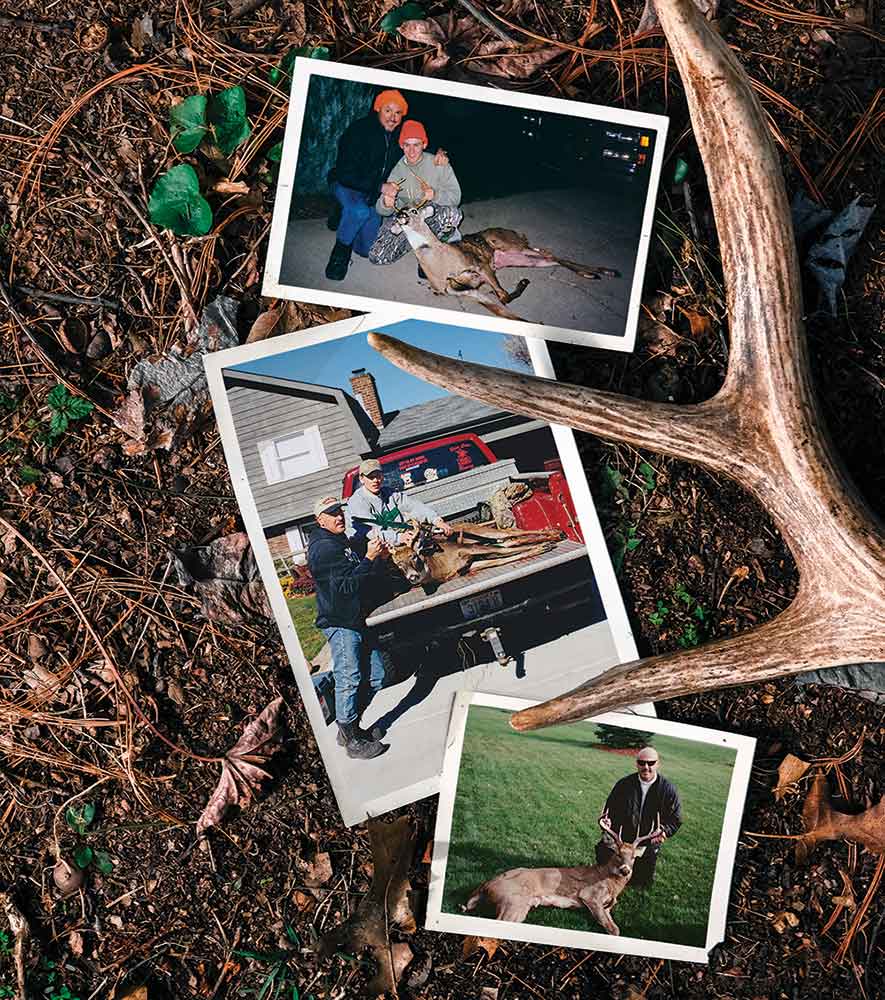
The author and his father in snapshots from a family album—deer seasons gone by in their home state of Indiana. Justin Appenzeller
The wood-stocked Ithaca 12-gauge Deerslayer, with the laser-cut image of mallards rising from open water on its receiver, spent most of the year propped next to the basement fireplace of my tri-level childhood home on Rustic Lane. The slug barrel stayed affixed to the old gun. Dad hadn’t swapped it out for the birder in years. One day every fall it was picked up, cleaned, and laid into the same plastic-and-aluminum case, with a deer framed in a diamond on the front. My early Christmas present on this, my 12th year, was a New Englander single-shot 20-gauge. Simple and solid, with a sticky break-open action. We take it out and sight in on a piece of cardboard pinned with reflective trail-marker thumbtacks to an old horse apple tree. Thirty yards, give or take, standing. The first few shots, the slugs all hit within about a pie plate. Rock ’n’ roll! The Indiana November deer opener was upon us and I was going hunting with my dad.
Cans of Spam, white bread, and yellow mustard are scattered over the counter. Tomato-and-milk soup is simmering on the gas stove. Ding Dongs are unwrapped and zipped into plastic baggies. These accoutrements of the hunt will become tradition. I still take a Spam-and-yellow-mustard sandwich with me on the first day of every hunting season. My dad, my brother, and I sit down to breakfast together, eager to greet the day on my aunt’s farm. The house is dark save for the fluorescent glow of kitchen lights. We talk about who’s going to hunt where. I want to hunt The Gap, but as low man on the totem pole, I’m relegated to The Wash. As always, Dad will be back in the Swamp Monster, along the best escape trail on the farm. The influx of people in the neighboring woods will have the deer on the run.
Sixteen years go by. My father sits in his pickup, the door open. A round is slowly, deliberately chambered. Hands, now out of gloves, jitter. Palms a little damp. It’s cold, damn cold. Fingers run over the blued steel, the scene of wild ducks. Seconds turn to minutes. Boom! Windows and sheet metal shake. The gun hits the pavement a split second before my dad. He lay there, alive, for minutes, I was told. Alone. Dying. Regretting? Relieved? Ashamed? I think I know. I can smell the burnt powder. The inside of the rear cab is covered, well, in my dad.
A few weeks later, my brother and I would drive that truck, carrying a small cedar box filled with my dad’s incinerated flesh and bone, down to my aunt’s farm, to say goodbye. I recall too clearly loading my backpack and “Mickey Mouse” boots into the rear cab, and picking up something whitish that looked out of place. I was holding a fragment of bone. We sit together, my brother and I, in the snow between The Gap stands, weeping and hugging. The wind shifts just as I untie the plastic bag inside the box, and my dad’s ashes blow back into our faces. “Scattering” ashes is not like some billowy Hallmark poem. It’s gut-wrenching, intense, and imperfect. It’s unnatural. Unnerving. And it never leaves you.
It was a suicide, but the fatal shot was through my dad’s chest. He was a hunter. Dying that way might take some time. He knew that.
My dad was the first-born son of three-times-divorced parents. His old man was an insecure, violent drunk, the son of another abusive drunk. My dad moved into his own apartment at 16 and finished high school while working nights stocking shelves at a family-owned grocery store. He met my mom around that time, and her family treated him like their own. He loved them, though I think subconsciously he also resented them. Their unconditional love seemed to dredge up in him old insecurities and hurt. He was a hard worker, athletically gifted, handsome, a fighter, and a salesman. His celebration of life was standing-room-only. He was authentic and full of contradictions. Friends and acquaintances revered him. He gave a lot of love, genuinely. His family—our family—knew the real him and loved him anyway.
When I was growing up, he ran a successful sales brokerage and would pull me out of school to go on road trips together. I’d sit in the waiting room at some supermarket-chain headquarters and entertain the other salesmen with my loquaciousness while he made us money. Some of the memories of him that I cling to most tightly emerged from those trips. I make it a point to take the same types of trips with my girls. He told me he loved me all the time. I believed him. I loved him back.
My dad was clinically bipolar. There were manic breakdowns of rage, anger, and insecurity that I know altered the evolving wiring in my young brain. Those moments bonded my brother and me together; he’s my best friend and buys me Father’s Day cards. My dad would break me down mentally. Make me quit and cry, and then chastise me for it. Other things happened, too, but those boxes are only opened with my brother, or when I’m alone and lost. When a manic loses himself in the throes of depression and anger, shameful, hurtful, irrevocable things happen. Salad bowls get thrown at mothers, kids get shoved, doors get locked on families who have to rent hotel rooms and order take-out. My mom, through what I imagine was painfully muted hurt and anger, turned one night in particular into a memory that both my brother and I look back on with fondness. We bought swim trunks from Kmart on the way to the hotel, swam in the pool, camped out on the bed, ate pizza and vending-machine candy, and watched TV. My brother and I were happy, and in my memory, so was my mom.
I am who I am largely because of my dad, and I say that without lament. More good stuck than bad, and I am constantly pushing myself to unlearn or re-learn around the bad. I have to evolve. I owe it to my kids, my wife, my mom, my brother, and my dad. He wanted desperately not to be his father. He was terrified of it. I want to be my father, evolved. I couldn’t know at 12, or 28, that my dad was a mortal man, fallible and flawed. I was just a naïve, young prick. It hit me like a crowbar to the head one night, a few years after he died, and working to find my way as a father and husband, that he became both at the same age as me—25. I should have cut him more slack. He could have been a better father. I should have been a better son.
I’ve been living in my head all day. It’s seven hours since I bested my will and crawled out of my bag into the frosty dawn. I’m covered now in gritty sweat, and miles from my Jeep, alone, lying awkwardly contorted on top of my pack. I lost my footing sidehilling a steep embankment, rolled for a bit, then abruptly piled up against a serendipitously lodged rock, battered and plenty pissed. I sit up, wipe my face, and take a few lung-filling breaths. My hands start to shake a bit, then violently. I close my eyes and begin to weep, then scream. Loudly. Voice cracking through my dry throat, I’m spewing up years of bottled rage, hurt, and regret. It’s cathartic, and I roll around in it like a pig in shit. I’m done running, done shoving it back down. I stop suddenly and look around wide-eyed. My dad is sitting here with me, his arm around me, and he pulls me in. “I love you, buddy.” I’m a 12-year-old boy again and we’re walking together in the dark to our stands. And then I am alone again. I sit for a few minutes on that steep Colorado mountainside. Then I stand up, shoulder my pack, cinch the waist belt, and resume the hunt. I’m okay. I’ll be okay.
